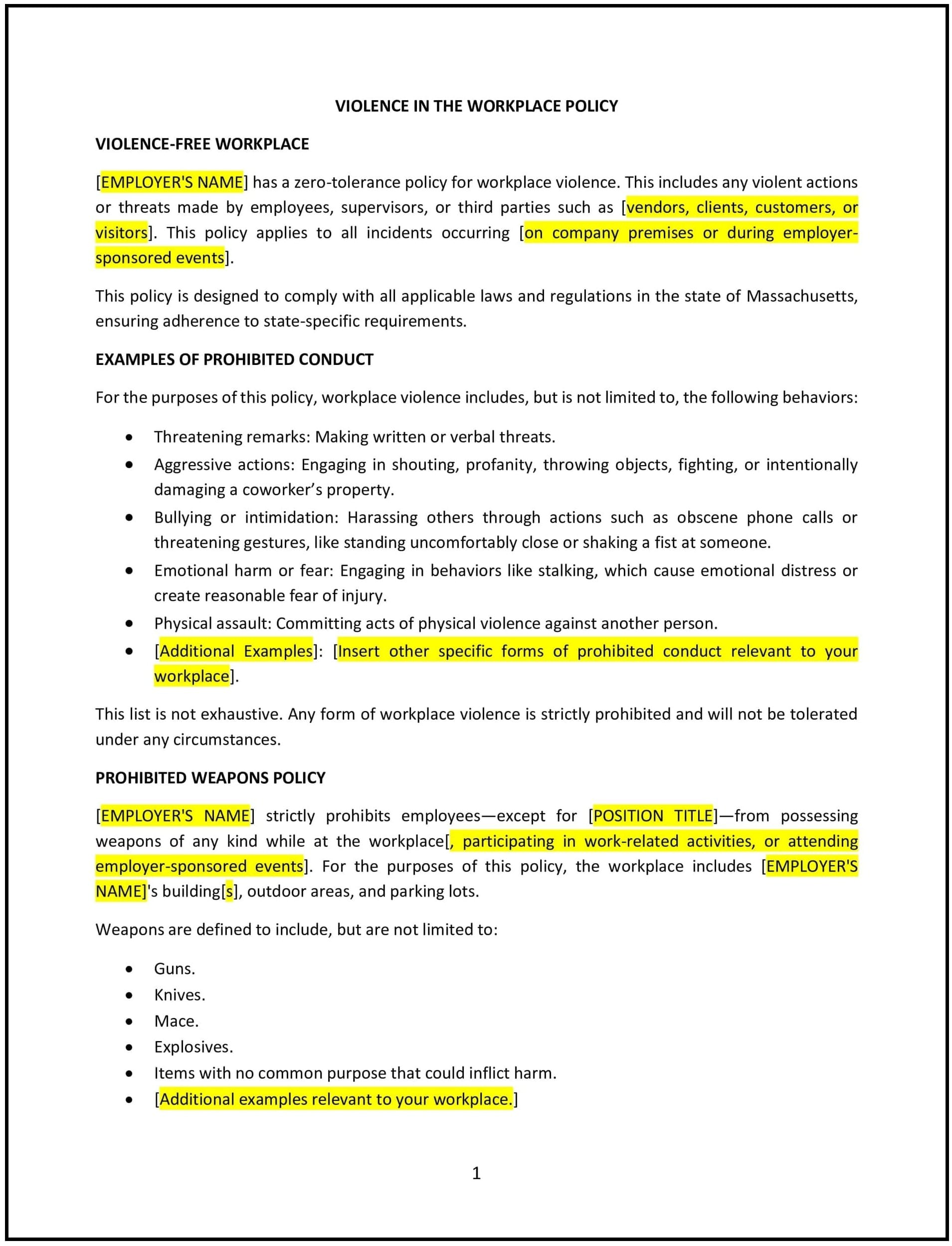Violence in the workplace policy (Massachusetts): Free template
Got contracts to review? While you're here for policies, let Cobrief make contract review effortless—start your free review now.

Customize this template for free
This violence in the workplace policy is designed to help Massachusetts businesses create a safe and respectful work environment by addressing the issue of workplace violence. The policy outlines the company’s approach to preventing, responding to, and managing incidents of violence, including physical assaults, threats, intimidation, and other forms of violent behavior. It emphasizes the company’s commitment to zero tolerance for violence and outlines the procedures for reporting, investigating, and addressing violent incidents.
By adopting this policy, businesses can reduce the risk of violence in the workplace, promote employee safety, and foster a culture of respect and professionalism.
How to use this violence in the workplace policy (Massachusetts)
- Define workplace violence: Clearly define what constitutes workplace violence under the policy. This may include physical assault, verbal threats, intimidation, bullying, harassment, and any other behavior that creates a risk of harm to employees, customers, or others in the workplace.
- Establish reporting procedures: Employees should be informed about the process for reporting incidents of workplace violence, whether it’s through a designated HR representative, a confidential hotline, or an online reporting system. The policy should specify how employees can report incidents safely and without fear of retaliation.
- Address preventative measures: The policy should include measures to prevent workplace violence, such as employee training on conflict resolution, maintaining a respectful work environment, and identifying warning signs of potentially violent behavior. It may also include background checks for new hires or contractors to help identify individuals who may pose a risk.
- Define the response to violent incidents: Outline the company’s response to incidents of violence, including how investigations will be conducted, the steps for addressing the situation, and the potential disciplinary actions that may be taken. The policy should emphasize a fair and thorough investigation process to determine the appropriate response.
- Implement support services: Provide employees with access to support services, such as counseling or Employee Assistance Programs (EAPs), if they are affected by an incident of workplace violence. The policy should specify the types of support available and how employees can access these services confidentially.
- Ensure compliance with Massachusetts and federal laws: Ensure that the policy complies with Massachusetts state laws, including those that govern employee rights and workplace safety, as well as federal regulations such as the Occupational Safety and Health Administration (OSHA) guidelines on workplace violence.
- Review and update regularly: Periodically review and update the policy to ensure it is compliant with any changes in Massachusetts state laws, federal regulations, or the company’s operations. Regular reviews will help keep the policy relevant and effective.
Benefits of using this violence in the workplace policy (Massachusetts)
This policy offers several benefits for Massachusetts businesses:
- Promotes a safe and respectful workplace: The policy helps businesses create a safe and respectful environment for all employees, reducing the risk of physical and emotional harm caused by workplace violence.
- Reduces legal risks: By implementing a clear policy for preventing and responding to workplace violence, businesses can reduce the risk of legal action related to violent incidents and create a proactive approach to handling potential issues.
- Enhances employee well-being: Providing a safe work environment where employees feel supported and protected can improve employee morale, reduce stress, and enhance overall well-being.
- Increases productivity: Employees who feel safe in their work environment are more likely to be engaged and productive. Reducing workplace violence can lead to a more focused, motivated workforce.
- Improves employee retention: By fostering a respectful and safe work environment, businesses can retain employees who feel valued and protected. A company with a strong commitment to workplace safety is also more attractive to potential employees.
- Promotes legal compliance: The policy helps businesses comply with Massachusetts state laws and federal workplace safety regulations, such as OSHA guidelines, reducing the risk of penalties or regulatory scrutiny.
Tips for using this violence in the workplace policy (Massachusetts)
- Communicate the policy clearly: Ensure that all employees are aware of the violence in the workplace policy and understand the company’s zero-tolerance approach. Include the policy in the employee handbook and review it during onboarding or regular training sessions.
- Provide regular training: Offer training to employees on how to recognize warning signs of workplace violence, how to handle conflict, and how to report incidents. This will help prevent violent situations before they escalate.
- Establish a clear reporting process: Make sure employees know how and where to report incidents of workplace violence. The policy should include multiple reporting options to accommodate different employee preferences, including anonymous reporting if necessary.
- Respond promptly to incidents: When an incident of workplace violence occurs, respond promptly and fairly. Follow the procedures outlined in the policy to investigate the incident, ensure the safety of all employees, and take appropriate disciplinary action.
- Provide support to affected employees: Offer support services such as counseling or EAPs to employees who are affected by workplace violence. Ensure that employees feel comfortable accessing these services without fear of stigma or retaliation.
- Review and update regularly: Periodically review the policy to ensure it is compliant with Massachusetts state laws, federal regulations, and any changes in the company’s operations or workforce needs.